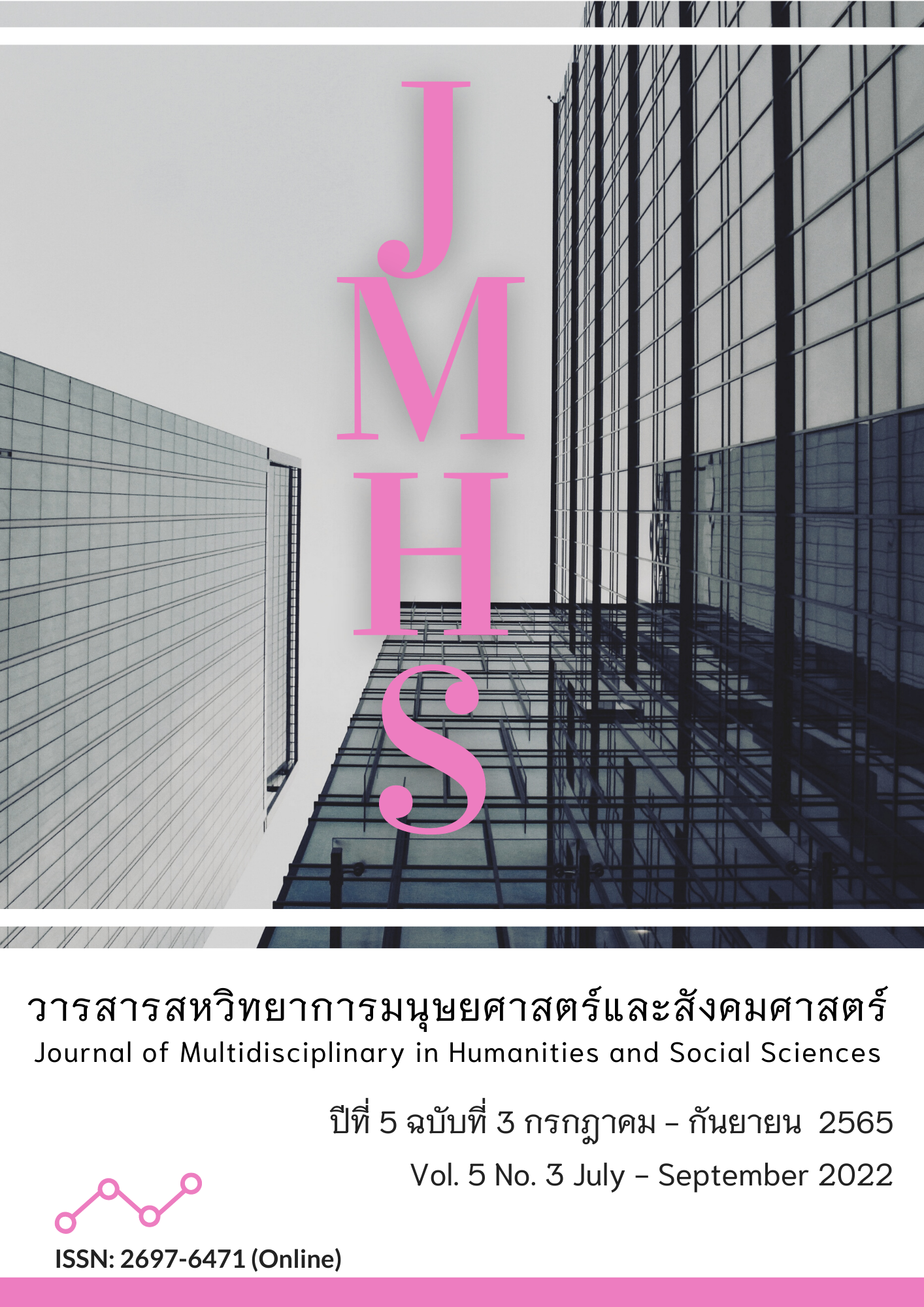Factors Influencing Environmental Conservation Behavior of Employees in an Electronic Component Manufacturing Company
Main Article Content
Abstract
This research aimed to study (1) level of problem awareness, awareness of consequences, ascription of responsibility, personal norm pro-environmental behavior, and pro-environmental behavior; (2) influence of problem awareness, awareness of consequences, ascription of responsibility to personal norm pro-environmental behavior; and (3) influence of personal norm pro-environmental behavior to pro-environmental behavior. The research collected information from 300 employees of an electronic component manufacturing company in Ratchaburi Province, by the quota sampling method. The research tool was a questionnaire. analysis of data by frequency, percentage, mean, standard deviation, Pearson’s product-moment correlation and regression analysis.
The research results were found as follows: most of the respondents were female, aged less than or equal to 30 years old, with undergraduate education, and a monthly income of less than or equal to 15,000 baht. The results of the data analysis at the opinion level revealed that opinion of variables by problem awareness, awareness of consequences at a high level, then opinion of variables by ascription of responsibility, personal norm pro-environmental behavior, and pro-environmental behavior at the highest level. The hypothesis testing results showed that problem awareness and ascription of responsibility positively influence personal norm pro-environmental behavior and personal norm pro-environmental behavior positively influence pro-environmental behavior statistically significant at level 0.05. While awareness of consequences has a negative influence on personal norms, the statistically insignificant. The findings from this research can be applied to relevant organizations as well to enable personnel in the organization to have more environmental conservation behaviors.
Article Details

This work is licensed under a Creative Commons Attribution-NonCommercial-NoDerivatives 4.0 International License.
Views and opinions appearing in the Journal it is the responsibility of the author of the article, and does not constitute the view and responsibility of the editorial team.
References
นภวรรณ ฐานะกาญจน์พงษ์เขียว. (2561). พฤติกรรมการรับผิดชอบต่อสิ่งแวดล้อมของผู้มาเยือนอุทยานแห่งชาติปางสีดา. วารสารอิเล็กทรอนิกส์ มหาวิทยาลัยศิลปากร, 11(1), 1707-1720.
นุจรี ป้องแก้ว. (2559). การเปรียบเทียบค่านิยม ความเชื่อ บรรทัดฐานและพฤติกรรมการออกแบบโดยคำนึงถึงความยั่งยืนด้านสิ่งแวดล้อมของผู้ออกแบบในอุตสาหกรรมก่อสร้างไทย. วารสารวิศวสารลาดกระบัง, 33(4), 67-73.
บุษกร คำโฮม. (2557). ปัจจัยที่มีผลต่อการตัดสินใจเข้าร่วมโครงการอุตสาหกรรมสีเขียวของผู้ประกอบการในจังหวัดอุบลราชธานี. วารสารปัญญาภิวัฒน์, 5(1), 92-104.
เบญจวรรณ บุณยรัตน์. (2557). ปัจจัยที่ส่งผลต่อพฤติกรรมการอนุรักษ์ทรัพยากรธรรมชาติและสิ่งแวดล้อม ของประชาชนชายแดนไทย-ลาว. วารสารสังคมศาสตร์วิชาการ, 7(2), 1-9.
พรนภา บุญรอด. (2561). ความสัมพันธ์ระหว่างการเปิดเผยข้อมูลความรับผิดชอบต่อสิ่งแวดล้อม สังคม และการกำกับดูแล กับประสิทธิภาพการดำเนินงาน กลุ่มทรัพยากรและสินค้าอุตสาหกรรม. วารสารสหวิทยาการวิจัย, 8(1), 49-60.
ภาวิณี กาญจนาภา. (2562). อิทธิพลของทัศนคติที่ส่งผลต่อพฤติกรรมการอนุรักษ์สิ่งแวดล้อมของประชาชนที่อาศัยอยู่ในเขตพื้นที่กรุงเทพมหานคร. วารสารความปลอดภัยและสุขภาพ, 12(2), 58-74.
ราตรี ภารา. (2559). ทรัพยากรธรรมชาติและสิ่งแวดล้อม. กรุงเทพฯ: อักษราพิพัฒน์.
วิลินธร ชูโต และ ชิษณุพงศ์ ประทุม. (2558). การรับรู้ของนักเรียนชั้นมัธยมศึกษาตอนปลายต่อปัญหาด้านสิ่งแวดล้อมและการจัดการ. วารสารวิจัยสหวิทยาการไทย, 10(3), 52-59.
ศักดิ์ศรี สืบสิงห์, นิธินาถ อุดมสันต์ และ สุภิมล บุญพอก. (2562). การศึกษาพฤติกรรมการอนุรักษ์สิ่งแวดล้อมเพื่อลดภาวะโลกร้อนของประชาชนใน ตำบลท่าม่วง อำเภอเสลภูมิ จังหวัดร้อยเอ็ด. วารสารมนุษยศาสตร์และสังคมศาสตร์ มหาวิทยาลัยราชพฤกษ์, 5(2), 193-203.
สำนักงานอุตสาหกรรมจังหวัดราชบุรี. (2564). รายงานประจำปี 2564. ราชบุรี: สำนักงานอุตสาหกรรมจังหวัดราชบุรี.
เอกลักษณ์ ธนเจริญพิศาล. (2555). ความตระหนักและการยอมรับการนำระบบการจัดการสิ่งแวดล้อม (ISO 14001) มาใช้ในองค์การภาครัฐ: ศึกษากรณีสํานักงานนโยบายและแผนทรัพยากรธรรมชาติและสิ่งแวดล้อม. วารสารสมาคมนักวิจัย, 17(1), 42-54.
Chiu, Y-T. H., Lee, W-I., & Chen, T-H., (2014). Environmentally responsible behavior in ecotourism: Antecedents and implications. Tourism Management, 40(1), 321–329. DOI: 10.1016/j.tourman.2013.06.013
Kenter, J.O., Hyde, T., Christie, M., & Fazey, L. (2011). The importance of deliberation in valuing ecosystem services in developing countries—Evidence from the Solomon Islands. Global Environmental Change, 21(2), 505-521. https://doi.org/10.1016/j.gloenvcha.2011.01.001


